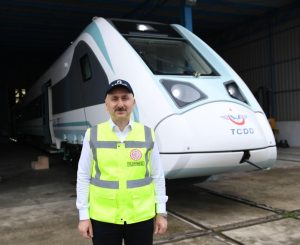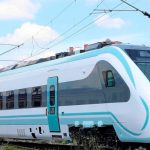
The Turkish-made electric train will begin in August the running tests and by the end of the year it will enter passenger services, after it will obtain the certification, the Minister of Transport and Infrastructure Adil Karaismailoğlu said during a visit to the Türasaş Sakarya train factory (the Turkish Railway Vehicles Industry Inc.).
In December 2020, the minister inaugurated the mass production of the domestic train. According to Türasaş Sakarya, the national electric trains are targeted to be exported to the European Union countries by 2023. The trains are compliant with the TSI standards, and their speed has been increased from 160 km/h to 200 km/h.
Sakarya has become an important industrial centre in the region and will support the development of rail transport through the merger of the three directorates [Tülomsaş, Türasaş and Tüdemaş] into one industrial company which ensure the production of different parts of rail system vehicles.
“We gained a new momentum in the rail system manufacturing processes in our country and started a new move in the national production by the reorganisation of the Eskişehir, Sivas and Sakarya directorates within the Türasaş Regional Directorate,” which is employing nearly 4,000 of qualified workers.
The mass production of the Turkish-made electric train is expected to begin in the last quarter of this year and by the end of the year, Türasaş will start to develop electric mainline locomotive, hybrid locomotive and suburban trainsets for which the prototype production started this year.
Within the scope of domestic and national projects strategy, the design and manufacturing for the first domestic train prototype was carried out at Türasaş Sakarya factory.
The new train will be able to run at speeds of 160 km/h, while the future high-speed train sets, which are currently designed are expected to reach a speed of 225 km/h.
Türasaş Sakarya will manufacture 32 electric trains which will be used on the Gaziray commuter rail line in Gaziantep. The plant will increase the localisation by 80 per cent in the mass production process from 60 per cent localisation used for the development of the prototype. The first order includes the delivery of 19 five-car trainsets (95 carriages).
By now, the Turasas plant has manufactured 2,300 carriages and provided repair and maintenance services for more than 38,490 passenger rail cars for TCDD, allowing Turkey to reduce its “external dependency in the field of rail vehicles, bringing significant contributions to the national economy,” the minister pointed out.
Türasaş Sakarya Regional Directorate, in cooperation with Sakarya University, Uludağ University started in 2010 the construction a Climatic Test Tunnel for the air conditioning systems of rail vehicles tests. In the same year, the Directorate started the production of diesel multiple units (DMUs) and has constructed a fleet of 84 vehicles of which 12 three-car and 12 four-car trains. The production of these vehicles was completed until the end of 2013 and delivered to the TCDD. In January 2020, Türasaş has completed all the requered tests for the 50th DMU out of 52 trainsets to be used on the national rail network.
Under a framework agreement with Hyundai Rotem, Türasaş delivered 275 vehicles for the Marmaray project.
Share on:






